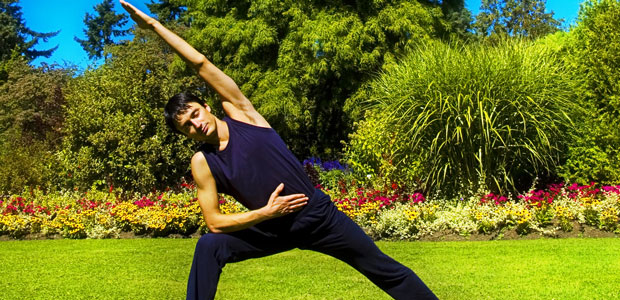Advertisement
Yoga for Men
Changing demographics Even as recently as the mid-19th century, yoga was taught only to men. According to ancient Hindu traditions, women were thought to reach enlightenment only in another lifetime—if they were lucky enough to be reincarnated as a man. The famous yogi B.K.S. Iyengar opened the door when he taught not only women but … Continued

Changing demographics
Even as recently as the mid-19th century, yoga was taught only to men. According to ancient Hindu traditions, women were thought to reach enlightenment only in another lifetime—if they were lucky enough to be reincarnated as a man.
The famous yogi B.K.S. Iyengar opened the door when he taught not only women but also Westerners in the 1960s. Women have come to dominate the landscape of yoga classes across Canada with a ratio of 72 percent women to 28 percent men.
How can one explain this radical flip-flop of roles in less than a century?
Perhaps there is something to the law of karma and centuries of chauvinistic male attitudes that have resulted in the current generation of men missing out on the great gift of yoga.
Or maybe it is the misconception that yoga classes are all about flexibility. Men are generally less flexible than women and have a strong desire to avoid appearing to do anything poorly.
Yoga instructors hear excuses daily from guys ranging from “The lotus pose is impossible” to “I can’t even sit on the floor” to the classic “I am just too inflexible to do yoga.” This logic makes no sense. Saying you are too inflexible to do yoga is like saying you are too dirty to have a shower! It is the perfect reason for doing something about it.
When we lose flexibility we feel old. It’s like trying to perform your daily activities while wearing spandex that is two sizes too small. You will always feel constrained, restricted, and quite simply, old.
Fitness
Flexibility is one part of yoga practice. Thinking that yoga is only about flexibility is like seeing baseball as a sport that only involves pitching. It may be a key part, but it does not represent the whole.
There are so many other components that make up this deep practice: balance, strength, coordination, and stamina to name just a few—and these are just the physical aspects.
Psychological benefits
There are many psychological and spiritual benefits to practising yoga. If there is truth to the stereotype that masculine energy is assertive while feminine energy is nurturing, yoga can balance these complementary qualities in a subtle but profound way.
If you practise yoga forcefully, trying to go deeper into the poses without balancing your practice with the ability to listen, there is usually just one result: injury.
The object of a yoga class isn’t to get one’s chin on one’s shin or to get the feet on one’s head but to leave the class feeling better and more vital than before the class started. This simple goal lowers the pressure to perform and makes the whole practice more approachable, therapeutic, and enjoyable.
So what are you waiting for? Grab a yoga mat and hit the studio!
Related Articles





